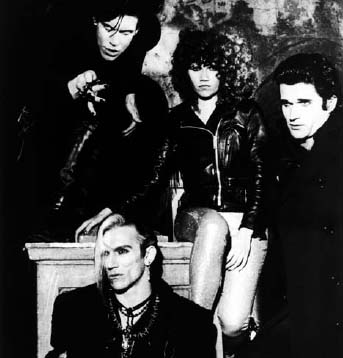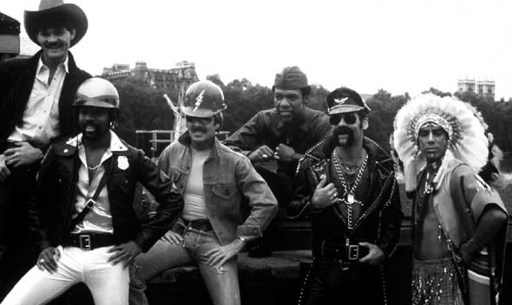The Encyclopedia of Dead Rock Stars (231 page)
Read The Encyclopedia of Dead Rock Stars Online
Authors: Jeremy Simmonds

‘You have people all around, but you can still be alone - like James was. He was tryin’ to be a star, but he didn’t know how.’
Roosevelt Jamison, James Carr’s manager

The Cramps in 1979: Bryan Gregory sits at the feet of lead behemoths Lux and Ivy - long-term drummer Nick Knox looks on
Wednesday 10
Bryan Gregory
(Greg Beckerleg - Detroit, Michigan, 20 February 1955)
The Cramps
(Various acts)

An original guitarist with Ohio-formed psychobilly shockers The Cramps, ‘proto-goth’ Bryan Gregory cut a striking figure alongside band mainstays the imposing Lux Interior (Erick Purkhiser, vocals) and vampish ‘Poison’ Ivy Rorschach (Kristy Wallace, guitar). The voodoo-obsessed axeman had met Interior at a New York record store and joined the band in 1976 (with his sister Pam Balam, the first of many drummers), lured by the promise of his very own Flying ‘V’. The Cramps had decamped to the Big Apple where they felt pickings might be richer. And they were right. Miles Copeland – manager of The Police, for whom the band opened several European dates in 1979 – signed the group to his Illegal label, issuing an EP and first-album-proper, the Alex Chilton-produced
Gravest Hits
and
Songs the Lord Taught Us
(1980), in quick succession. Gregory was only around for this first album, but Ivy is quick to suggest that he didn’t even contribute much to the recording of that, either: instead, the guitarist just
looked
the part, turning heads wherever he went – and even pulling a switchblade on a group of besuited businessmen who dared to laugh at him in a restaurant. Unhappy with their musical direction, Gregory left The Cramps in 1980 – apparently disappearing with the van and most of the group’s equipment! While his former colleagues went on to greatness in his absence, Gregory turned up again with the faintly desperate Beast a couple of years on, later joining two further acts, The Dials and Shiver, before fading from the underground rock scene. Bryan Gregory suffered a heart attack after a long period of ill health, finally dying from pneumonia at California’s Anaheim Memorial Medical Center.
See also
Lux Interior ( February 2009)
February 2009)
FEBRUARY
Golden Oldies #10
Theophilus Beckford
(Trenchtown, Jamaica, 23 December 1935)

Credited by many as one of the key originators of ska, Theophilus Beckford honed his craft practising on the family grand piano, aping his favourite Roscoe Gordon jump-blues records as he did so. Beckford is probably best remembered for the Clement ‘Coxsone’ Dodd-produced ‘Easy Snappin’’, a 1956 hit later revived for a nineties jeans commercial. Beckford received few royalties, however: despite working with the likes of the late Desmond Dekker, Lord Flea and Toots & The Maytals, he led a life of poverty in Trenchtown.
His time came on 19 February 2001, following a violent dispute with an acquaintance in the neighbouring district of Callalew Mews. The furious row had continued for some time before the man attacked Beckford with a machete while his back was turned. His assailant planted the weapon into the musician’s skull, killing him in an instant.
MARCH
Sunday 4
Glenn Hughes
(New York, 18 July 1950)
The Village People

They could have been The Spice Guys – six costumed cockerels manufactured by producer Jacques Morali to cash in on New York’s blossoming gay disco scene. The recruitment was simple; the small ad, specific: ‘six singers and dancers, must be good-looking, gay and sporting moustaches’. Thus, in 1977, the phenomenon that was The Village People was born. The group couldn’t fail with its outlandish East Village stereotypes: the naval serviceman (Alex Briley); the construction worker (David Hodo); the cowboy (Randy Jones); the Native American (Felipe Rose); the cop (Victor Willis). The eldest, and perhaps most outrageous, was Glenn Hughes, a former toll-collector now dressed as little more than a leather enthusiast whose get-up summed up pretty much where these People were coming from. And, boy, did it work – and not just at home: ‘YMCA’ topped the UK charts in late 1978, also selling over a million in the US, ‘In the Navy’ (1979) not falling far short of the same mark. There were other rollicking hits as well: ‘Macho Man’ (1978), ‘Go West’ (1979 – the tune that also led to the outing of The Pet Shop Boys some years after) and ‘Can’t Stop the Music’ (1980) – the latter from the largely forgettable musical of the same name.

‘People’ get ready: Jones, Willis, Hodo, Briley, Hughes and Rose prepare to take on the big boys
The hype was over by the mid eighties (lead singer Willis even blowing his gay cred by marrying
Cosby Show
actress Phylicia Rashad), although The Village People continued to tour, hanging up their gear for the last time shortly before Glenn Hughes’s death. By the time Hughes had been diagnosed with lung cancer, it was too late to save him: at his funeral in Manhattan his fellow Village People acted as pallbearers.
Wednesday 7
Michael ‘Smitty’ Smith
(Beaverton, Oregon, 27 March 1941)
Paul Revere & The Raiders
(Brotherhood)

Michael ‘Smitty’ Smith was such a popular member of Oregon poprockers Paul Revere & The Raiders that the pin-up drummer had his own fan club. After a slow start with the lone 1961 hit ‘Like Long Hair’, The Raiders – Smith, Mark Lindsay (vocals), Paul Revere (keyboards), Drake Levin (guitar
e July 2009)
and Mike Holiday (bass, replaced by Phil Volk) – became something of a sensation as America began to bite back at the British invasion. Between 1965 and 1969, the group scored a formidable run of hits, including ‘Kicks’, ‘Good Thing’ (both 1966) and ‘Him or Me – What’s It Gonna Be?’ (1967), though Smith jumped from the bandwagon briefly to start a new project, Brotherhood, with Levin and Volk, before returning to The Raiders for their only US number one, ‘Indian Reservation’, in 1971. Retiring a couple of years later, Smith could only be tempted from his Hawaiian idyll by a Raiders reunion gig in 1997, three years after which he passed away from natural causes.
Golden 0idies#11
John Phillips
(Parris Island, South Carolina, 30 August 1935)
